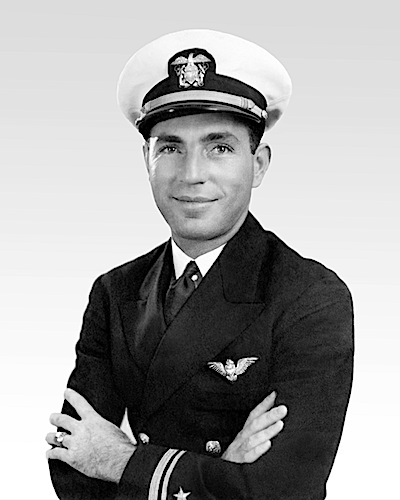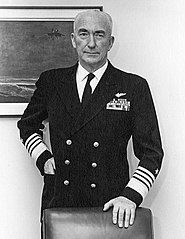Captain Leslie Gehres—Martinet Or Magnificent?

On 19 March 1945, approximately 50 miles off the coast of Japan, a Japanese bomber attacked USS Franklin (CV-13), an Essex-class carrier commanded by Captain Leslie Gheres. 807 men died in the resulting conflagration.1 The response by Captain Gehres, his crew, and the ships and aircraft that came to her aid, saved Big Ben, as her men called her.
The damage she suffered was greater than that suffered by USS Lexington (CV-2) sunk at the Battle of Coral Sea and USS Yorktown (CV-5) which was damaged at that battle and sunk at the Battle of Midway. As a result of the heroic actions of the ship’s crew, they became the most decorated in U.S. Navy history (and remain so to this day). She also suffered one of the most serious injustices done to a crew by their captain. Many of the crew felt that injustice for the rest of their lives. Gehres tried to have seven officers court-martialed and turned hundreds of others into outcasts for leaving the ship, even when they faced certain death by staying.
Central to Big Ben’s story is the personality, leadership style, and actions of Leslie Gehres. This is the first post in an occasional series that will take a closer look at the captain.
“Custer of the Aleutians”
He was the commanding officer of Patrol Wing Four when war broke out.2 There, he rose to the rank of Commodore, a temporary rank equivalent to a one-star Admiral. The officers and men who knew and served under him in the Aleutians or in the ship’s crew on Big Ben either respected or hated him. Author John Cloe, in his book, The Aleutian Warriors: A History of the Eleventh Air Force and Patrol Wing 4, wrote that one of Gehres officers later recalled that he
was the toughest, most ornery SOB that I ever encountered during my many years in the Navy, but I respected him. He had a war on his hands, and he would sacrifice people and equipment without a second thought if it meant keeping the upper hand on the enemy.3
Captain Stephen Jurika, in his Reminiscences, states that Gehres had been fired from his position there as ComAir. He took a demotion to become Franklin’s captain.4 Joseph Springer, in his book, Inferno: The Epic Life and Death Struggle of the USS Franklin in World War II, states that Gehres had been chastised by Admiral Chester Nimitz for using PBYs, which were designed for patrol, as bombers resulting in a high loss of men and aircraft. For this and other reasons, he received the nickname, “Custer of the Aleutians.”5
Meanwhile, others, especially the enlisted men on board Franklin, described him as a tyrant.6 I have attended two reunions of the crew and their families. No one there had anything kind to say about the captain.

Stephen Jurika Believed Leslie Gehres Was Magnificent
Jurika was assigned to Big Ben in December 1944 and came aboard at Bremerton where she was being repaired after the kamikaze strike in October. More than 20 years later when he was being interviewed for his oral history, he remained a strong supporter of Captain Gehres. Jurika stated:
He was really magnificent. He demanded every one of his watch officers to be a competent seaman, to be able to handle that ship, if he were killed, if I was killed, right down the line. The last JG who was qualified as officer of the deck would be able to bring that ship in.7
Jurika recounted several instances of Gehres’ own exceptional ability to handle ships, leaving Bremerton, arriving at Ulithi, and the final voyage back to the Brooklyn Naval Yard. However, he omits any mention of Captain Gehres refusing to allow a pilot to navigate Franklin to its birth at Pearl Harbor after the attack. It was standard practice at Pearl Harbor to bring on board a pilot who would conn the ship through the tricky channels. Gehres insisted on conning the ship himself. He miscalculated the distance to the dock sending most of the dignitaries scrambling for safety when he rammed the dock. He blamed the ship’s mooring crew.8
To Stephen Jurika, Captain Leslie Gehres could do no wrong.

James Russell Did Not Share Jurika’s Opinion of Leslie Gehres
Not so then Commander, and later Captain James Russell. In reading oral histories of senior Navy commanders I notice that they seldom criticize other officers with whom they served. The only exceptions I have found are John Thach criticizing Admirals Spruance, Fletcher, and Captain Buckmaster for not operating the U.S. carriers in such as way as to provide better force protection at Midway. Admiral Halsey comes in for criticism of his actions in the typhoons he encountered. But these are both well-known topics that have been seriously debated since they occurred. When the topic is not up for debate, officers don’t talk ill of their brethren.
Jurika also abides by this rule. Responding to a question asked by his oral history interviewer, he replied:
It turns out an officer whose name I will not mention (Emphasis mine-GR) but who has since made captain went over on the highline (a line rigged between Franklin and the cruiser Santa Fe to transport wounded or nonessential men off the ship).9
Russell served under Gehres in Alaska for eleven months as Squadron Commander of VP-42. It was composed of PBYs originally designated as a scouting squadron. In 1945, Russell, by then a captain, would find himself on Franklin serving as Chief of Staff to Rear Admiral Ralph Davison, commander of Task Group 58.2. Admiral Davison flew his flag from Franklin.
Russell would retire as a four-star admiral in 1965. He too was interviewed for the same oral history program that had interviewed Stephen Jurika. In reading The Reminiscences of Adm. James S. Russell, USN (Ret.), several things stood out to me. First, Admiral Russell frequently named officers that had been effective in their jobs including General Simon B. Buckner, who commanded U.S. Army forces in Alaska. He named also dozens of other men that crossed his path in the Aleutians.
Except for Captain Leslie Gehres.
Interviewed about his time in the Aleutians, ten times Russell refers to Gehres only as “Wing Commander.” Twice, he refers to him as “Commodore.” But he never mentions Gehres by name. To me, the silence is deafening.
Later, when he discusses his time on Big Ben, he refers five times to “the skipper.” Only once, does he mention Gehres by name. And that’s indirectly as he states:
The admiral was a little loath to leave. However, he went up and said farewell to Gehres,….10
A few days later, after both Franklin and Russell returned to Ulithi, in response to a question by his interviewer, Russell said:
Everyone who came aboard went before a reception commitee. The skipper was determined he’d take nobody from his crew back aboard who’d gone over the side, which I thought was a little bit unnecessary. (Emphasis mine-GR)
Q: Enveloped in flames, should they stay aboard?
Adm. R.: And get burned to death? Should think they’d hit the sea! 11
“…a little bit unnecessary.”
I am sure you are familiar with the phrase, “damning with faint praise.” In this case, it’s damning with a masterful understatement.
Questions I Am Researching
As the Essex-class carriers were commissioned, Naval aviators who were experienced ship handlers were in short supply. Gehres, a mustang, was an experienced naval aviator and the first officer to captain a fleet carrier who did not graduate from the Naval Academy.12 (I’ve read several sources stating that Naval Academy graduates looked down upon those who became officers by a different route, either up from the ranks or Reserves.)
- Did he respond by developing a chip on his shoulder and by pushing men under his command to needlessly endanger themselves in order to prove something?
- Did he deflect blame for his own mistakes to others?
- Was this why he was one of those rare individuals that people either respected or detested?
- When he learned that many men had no choice but to jump overboard, why did he still insist on ostracizing them?
Captain Gehres and his crew managed to repair Big Ben so that she was able to make her way, first to Ulithi, then to Pearl Harbor. There it was determined they did not have the facilities to repair her, so she sailed to the Brooklyn Naval Yard completing a journey of about 12,000 miles from where she was attacked.
He would receive the Navy Cross for his actions on 19 March 1945 but he would never command at sea again. He would retire as a Rear Admiral after the war.
I find this story fascinating. On the one hand, we have the courage of the ship’s crew (and those of other ships and aircraft that helped save them). On the other, we have Captain Gehres attempting to court-martial seven of his officers and refusing to allow many others back on his ship for what he saw as desertion. I look forward to continuing my research and sharing my findings with you.
Did you arrive here via a search engine? I am the author of the forthcoming book, Heroes By The Hundreds: The Story of the USS Franklin (CV-13). In addition to writing about the bravery of the crews that saved her, I will be writing about the lessons we can learn in leadership and crisis management. I’ll also write about the changes the US Navy made as a result of those lessons learned.
I send out a monthly newsletter, Glenn’s After-Action Report, writing about subjects I find interesting in my research. You can sign up for it below. Feel free to leave a comment or ask a question. Thanks for reading.-Glenn
Footnotes
- Joseph A. Springer, Inferno: The Epic Life and Death Struggle of the USS Franklin in World War II, (Minneapolis, MN, Zenith Press, 2011) 317
- William J. Stewart, A Call to Duty: The Life and Times of Leslie E. Gehres (Port Charlotte, FL: Book Brokers Publishers, 2016) 56
- John Cloe, The Aleutian Warriors: A History of the Eleventh Air Force and Patrol Wing 4 (Anchorage: Anchorage Chapter, Air Force Association ; Pictorial Histories Pub. Co, 1990) 238
- The Reminininscences of Capt. Stephen Jurika, Jr., USN (Ret.) , Vol. II (Annapolis, US Naval Institute, 1979) 605
- Springer, 171
- Springer, 181
- Jurika, 608-09
- Steve Jackson, Lucky Lady: The World War II Heroics Of The USS Santa Fe and Franklin (New York: Carroll and Graf, 2004) 449-50
- Jurika 640
- The Reminiscences of Adm. James S. Russell, USN (Ret.) (Annapolis: US Naval Institute, 1976) 220
- Russell 240
- Jackson, 288-89
2 Comments
Leave a Comment
You must be logged in to post a comment.
[…] of 19 March 1945 impacted both the ship’s crew and Air Group 5 of USS Franklin. Because Captain Gehres ordered the air group off the carrier, most of my research has been focused on the crew. But the […]
[…] no doubt that Captain James Russell had little respect for Captain Leslie Gehres. (More about that here.) When the report was written, Gehres was already vocal about some officers and enlisted men […]